Producing a successful podcast isn't just about recording an episode and sharing it on social media. In fact, the whole process is filled with individual tasks like in-depth research, concepting, careful scripting, detailed editing, branding, and so on. And realistically, some of this can often feel like a bit of a chore.
But here's the good news: AI tools like ChatGPT for podcasters are changing the game. If used well, they can help hosts work smarter, streamline tasks, and enhance content quality.
In this article, we're diving deep into the world of ChatGPT for podcasters. We'll explore its potential, some practical ways to use it, best practices, and even its future in the podcast industry. The goal is to give you — the podcast creator — a thorough understanding of how to tap into the power of ChatGPT to level up your podcasting.
Let’s get straight into it…

Book Your Next Podcast Guest the Easy Way
With more than 70,000 members, MatchMaker.fm is the largest online community connecting podcasters & guests.
Join MatchMaker todayWhat Is ChatGPT?
ChatGPT is an advanced language model developed by OpenAI, a leading artificial intelligence research laboratory. Its design allows it to generate human-like text, making it a powerful tool for conversation and content creation. And while it's essential to remember that its knowledge is based on data up until 2021, this doesn't diminish its potential to help you reach your podcasting goals.

How Can ChatGPT Help Podcasters?
In terms of podcasting, ChatGPT's potential is impressive. It can help podcasters stand out in an increasingly crowded market, in numerous ways. Its capability to generate unique, engaging content means you can create interview questions, website copy, emails, scripts, and topic ideas in a matter of minutes.
It doesn’t end there, either. Because it can also be used in post-production. ChatGPT excels at crafting detailed show notes and accurate episode summaries, enhancing the accessibility and searchability of your podcast.
All in all, ChatGPT allows podcasters to streamline their workflow, increase content quality, and focus on what they love most - creating the best podcast for their audience.
5 Ways ChatGPT Can Help Create Engaging Podcast Content
ChatGPT's capabilities extend across the entire podcasting process. From the spark of an idea to the final touches (and beyond), this AI tool can lend a hand at each stage. Below are 5 tasks ChatGPT can help hosts with.
1. Podcast Topic Ideas
One of the initial challenges for podcasters is consistently coming up with fresh, engaging episode ideas. That's where ChatGPT comes in. Feed it some basic parameters (such as your podcast's theme or target audience interests), and it’ll generate a list of potential topics. From there, it’ll help you brainstorm ideas that align with your podcast's tone and resonate with your audience, keeping your content fresh and relevant.
To put this into practice, and to show you an example of how this might look, we asked ChatGPT to provide us with a list of five episode topics for a marketing show about branding. We gave it a couple of prompts - such as a podcast name, a description, and a list of past episodes. Here’s what it suggested:
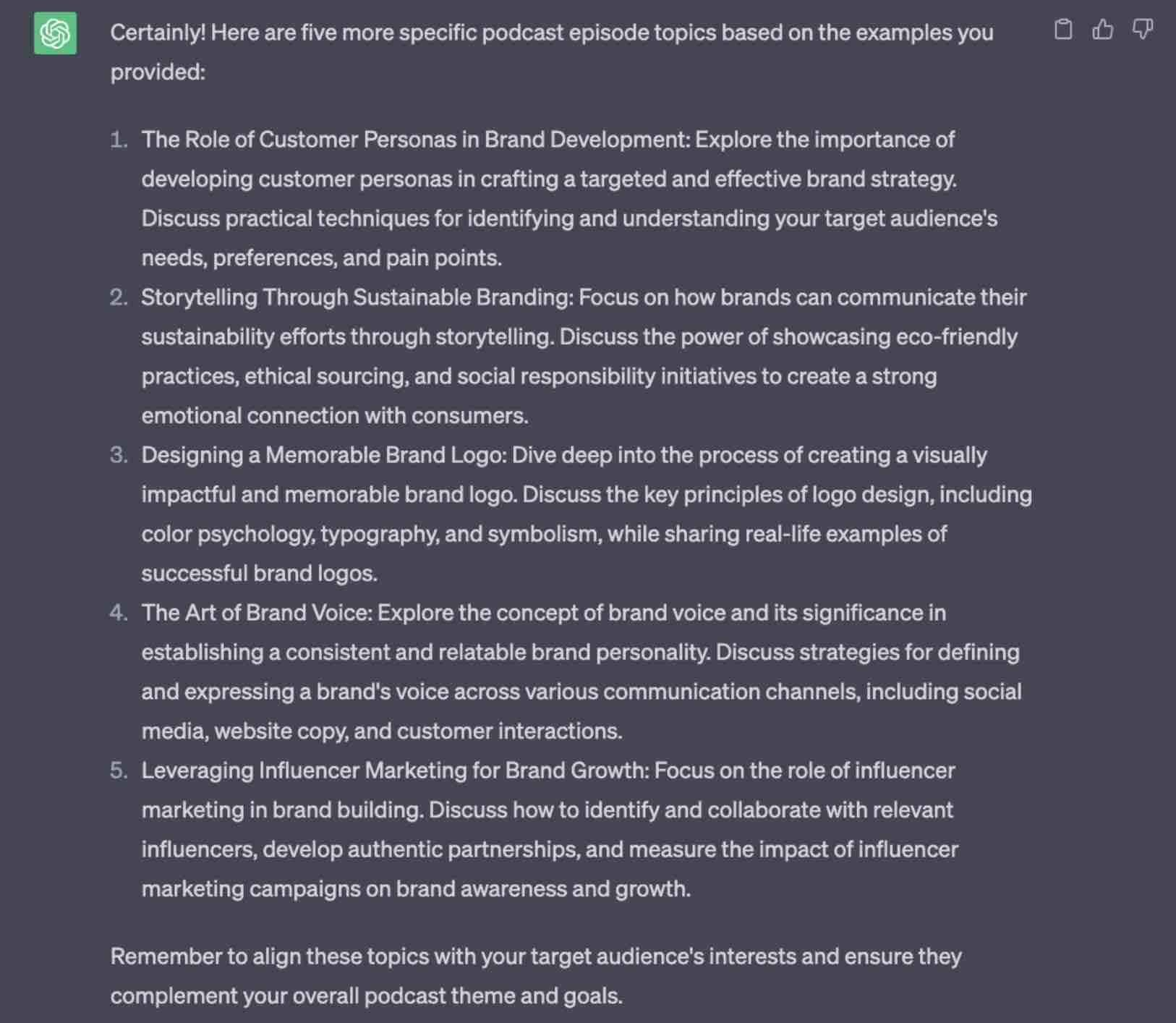
2. Guest Interview Questions
Moving from idea to execution, ChatGPT can help podcasters compile a list of interview questions to ask their guests. If you’re using the AI tool for this purpose, it’s important to input context about the guests - such as their professional background, area of expertise, and the intended discussion topic. Again, the more background information you give it, the better.
Here’s an example of this in action:
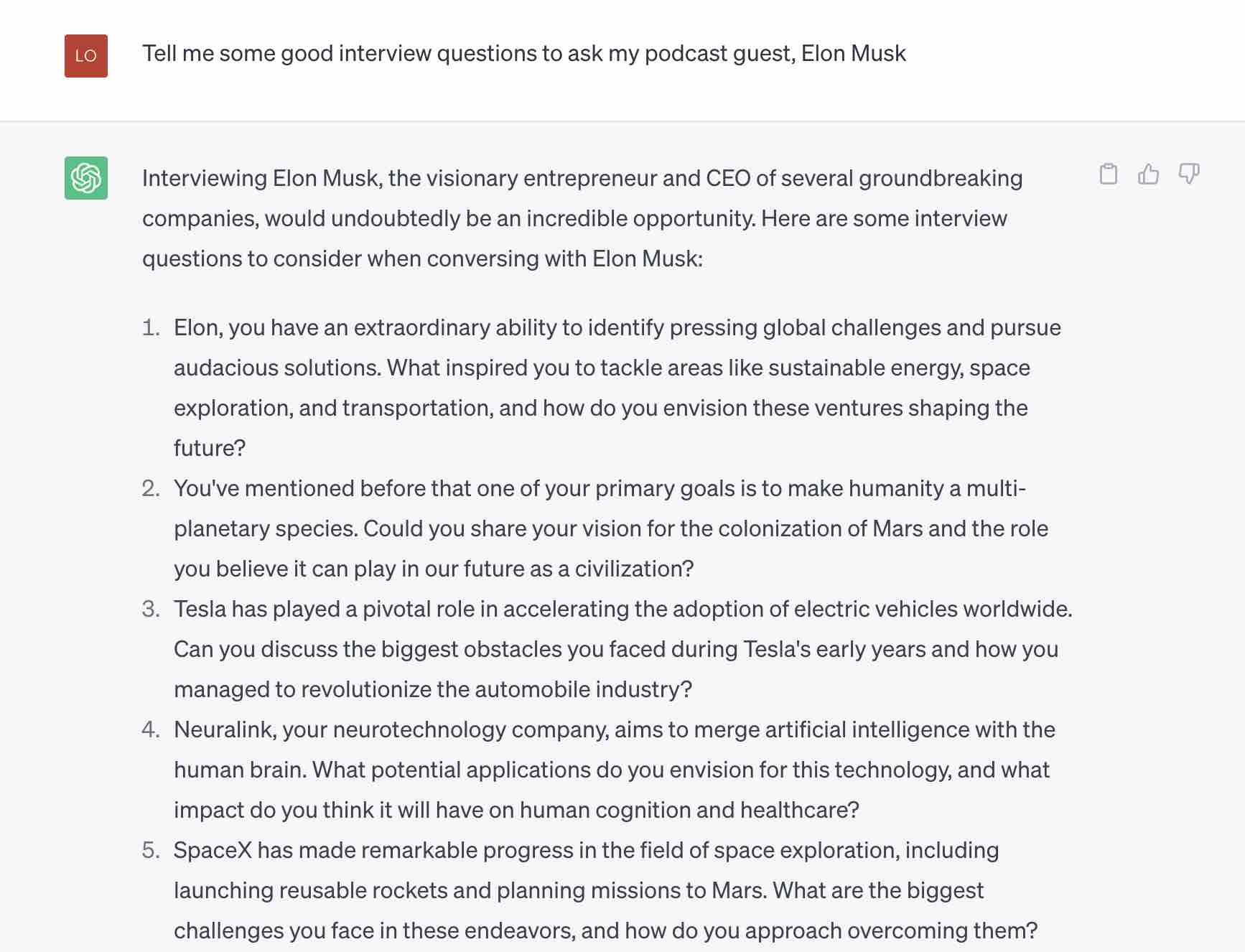
Along with crafting the perfect guest interview questions, ChatGPT can also help podcasters formulate the perfect outreach email (including a high-performing and click-enticing subject line) to convince potential guests to come onto their show.
That being said, we wouldn’t recommend asking ChatGPT to come up with names of potential guests. It simply doesn’t serve niche enough results, and can be quite generic in its response. We tested this out with a fictional branding podcast, for example, and it only recommended big names like David Aaker, Seth Godin, and Simon Sinek — which, let’s be honest, would never have the time to come on a small indie podcast about branding.
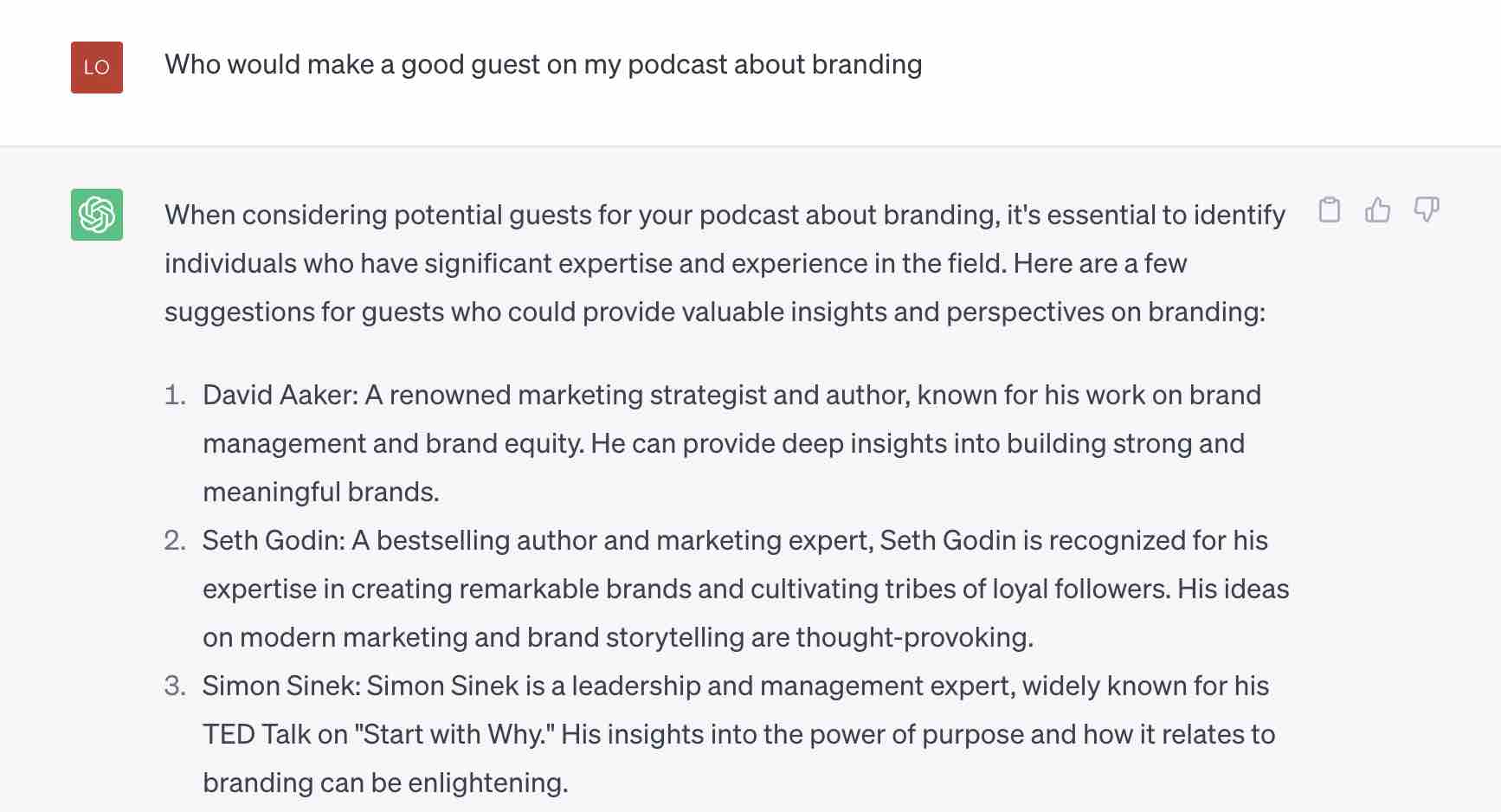
3. Scriptwriting
Whether you need a detailed script or just a loose episode structure, ChatGPT can generate it based on your prompts. Again, prompts can include information like the episode's goals, target audience, and main points. You can also provide the AI tool with example scripts you’ve previously used and particularly like, and ask it to mimic the style, tone, or voice.
Again, here’s an example below:
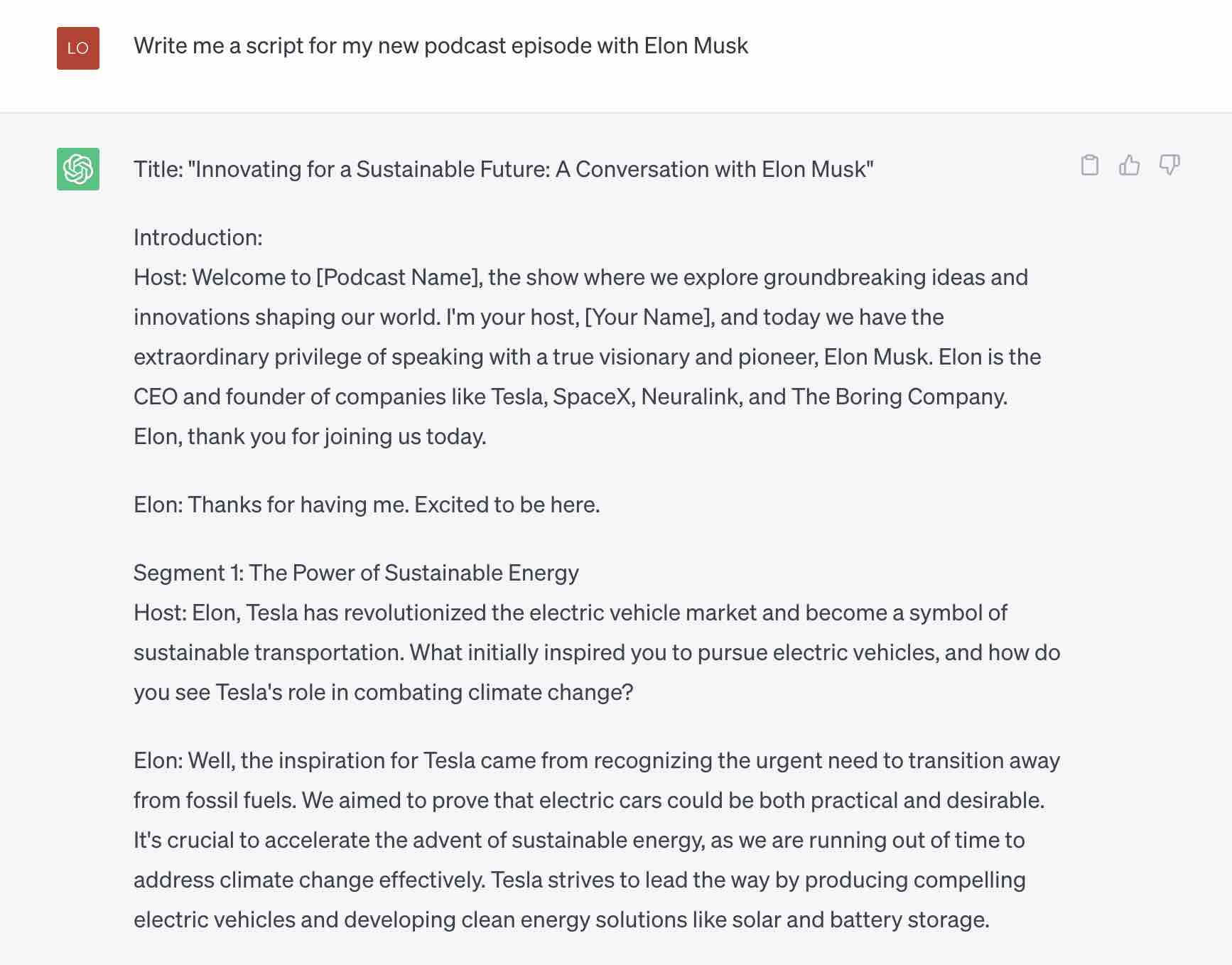
4. Post-Production
When it comes to post-production, ChatGPT shines in creating comprehensive show notes and summarising episodes. Show notes are essential for SEO, and can help listeners navigate your content. Similarly, ChatGPT can generate concise, accurate episode summaries, making your content more accessible and helping to attract a wider audience. All you need to do is ask ChatGPT to create show notes or an episode summary from your podcast episode transcript, and then see what it creates.
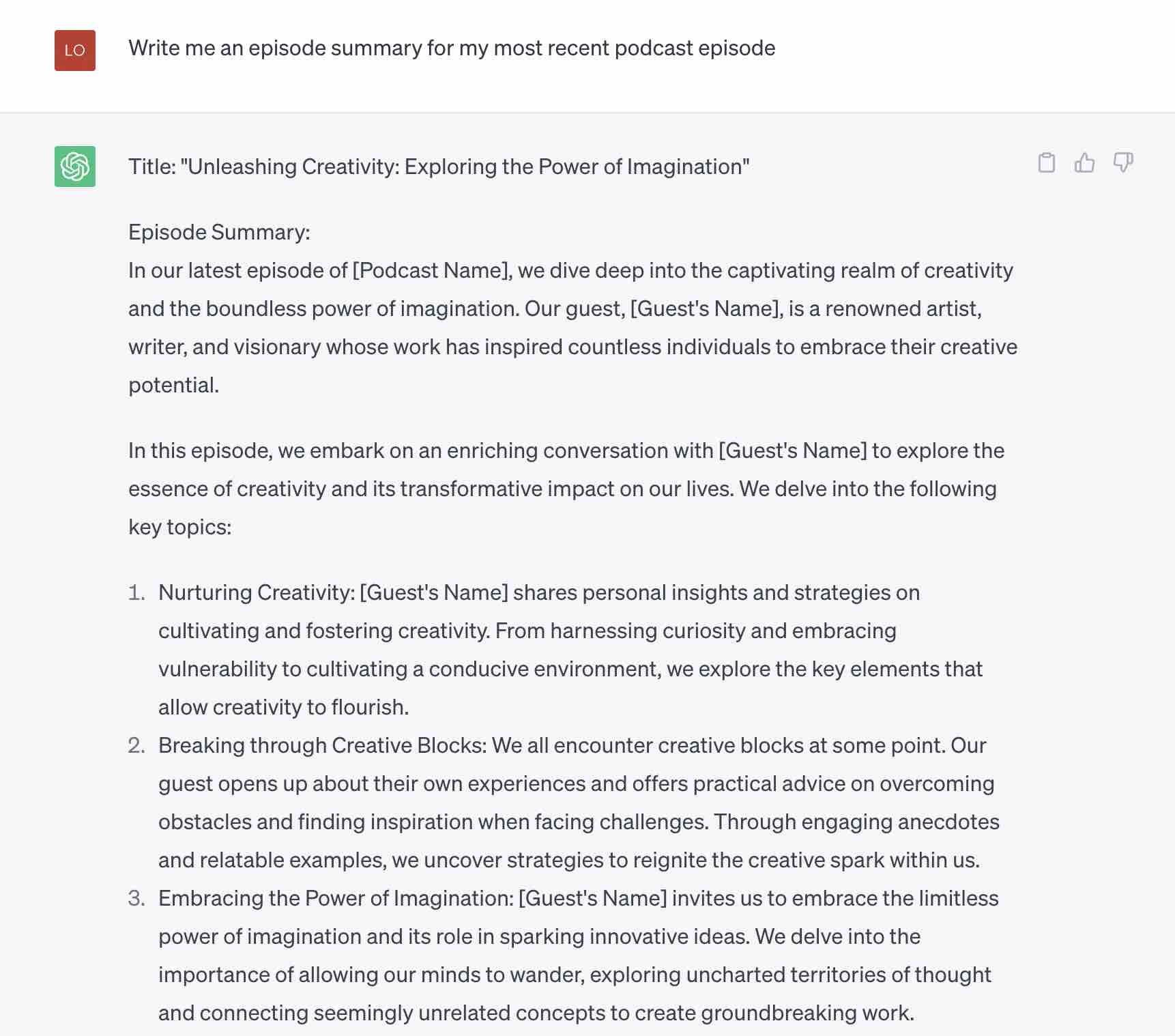
5. Engagement, Outreach, & Social Media
The magic of ChatGPT doesn’t just stop when you hit publish on your latest episode. It can also help you boost engagement, drive outreach, and extend your social media reach. The best way to do this is through asking it to create engaging tweets, Instagram and LinkedIn posts, and email campaigns announcing your recent episode to subscribers.
To show you this in action, we asked ChatGPT to write a tweet promoting an episode of Productivity Puzzles - a podcast produced in partnership with Cue Podcasts and The Productivity Institute. Here’s what it came up with:
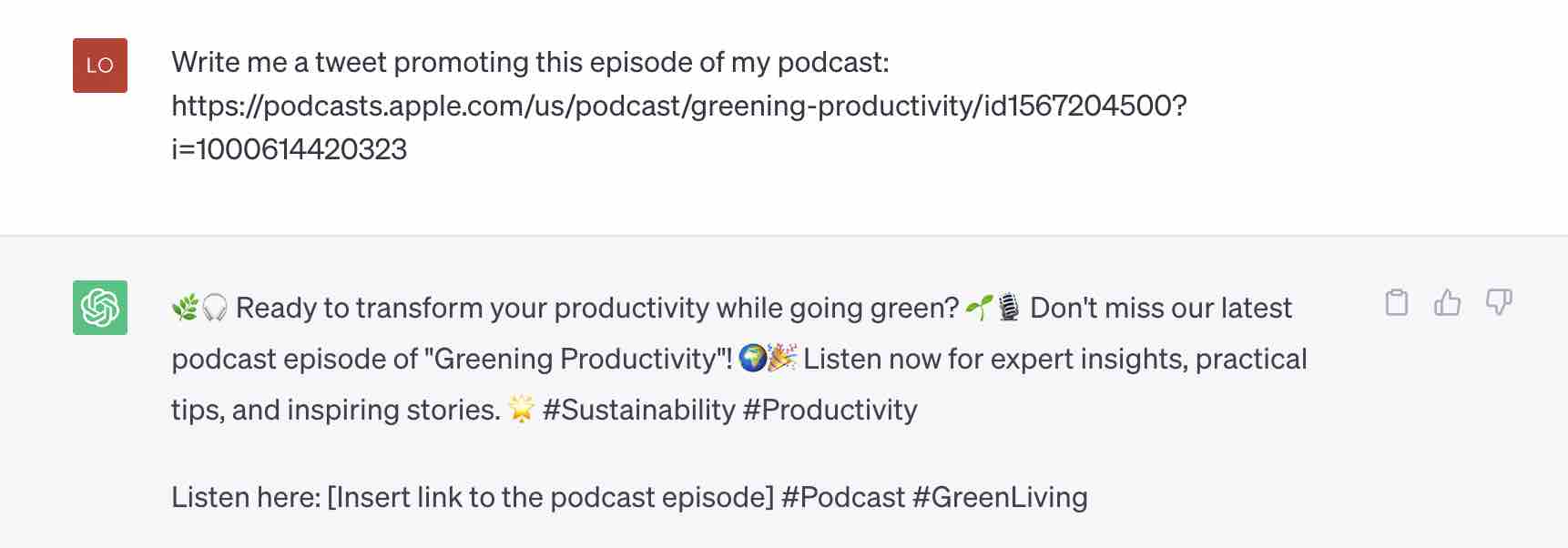
ChatGPT can also help you draft the perfect podcast press release to send to journalists, or pull meaningful quotes from your podcast episode transcript that you can repurpose into social posts. The sky really is the limit.
On top of everything, ChatGPT can help podcasters experiencing writer’s block. All they’ll need to do is input whatever they have, and ask it to improve it. If you’re using ChatGPT for this purpose, make sure you provide it with context regarding previously written content, and ask it to follow the same structure, tone, and voice for conciseness.
How to Maximise Your ChatGPT Prompts
As mentioned previously, the true potential of ChatGPT unfolds when it's guided by practical and thoughtful prompts, especially for podcasters. This is because crafting the right prompts can lead to more accurate and specific responses, enriching the podcast production process at various stages.
ChatGPT operates on an AI learning model, so every prompt it receives helps it refine its future responses. It’s designed to learn from each interaction. So, spending time providing it with the relevant background information about your podcast can be hugely beneficial.
For example, instead of writing something like “give me some podcast topics for tech entrepreneurs targeting startup founders”, start with context. Provide things like the podcast name, description, and target audience. Ask if it understands the information you’ve provided, and if it has any follow-up questions. Spend some time teaching it about your podcast - this will help it refine its responses.
The key to maximising your prompts is to be specific. If you do re-write something, tell (and show) it what you’ve changed. And if you don’t like something ChatGPT has written, be specific on what you don’t like and ask for another version. The more back-and-forth, the better your piece of content will be.
Specific and contextualised prompts are the keys to unlocking the full potential of ChatGPT for podcasters
The Future of Podcasting with AI Tools, like ChatGPT
In the realm of podcasting, AI tools like ChatGPT for podcasters are set to continue revolutionising the industry. The ongoing advancements in natural language processing could lead to AI tools understanding and mimicking human nuances more effectively, enhancing their content generation capabilities. This could mean more personalised and targeted podcast scripts, fuller show notes, and much more bespoke promotional materials.
As podcasters, harnessing AI tools like ChatGPT is a strategic move. These tools have the capacity to automate tasks, reduce manual effort, and deliver high-quality content. As we look ahead, we can anticipate a podcasting landscape much more dynamic and innovative, driven by the synergistic blend of human creativity and artificial intelligence.
Final Thoughts: ChatGPT for Podcasters
ChatGPT can be a fantastic addition to every podcaster’s arsenal, and the benefits are hard to ignore. Its ability to create content for every step of the podcasting stage can potentially transform the lives of every overworked and overstressed podcaster.
Embracing AI tools like ChatGPT can help you stand out, deliver value to your audience, and stay ahead of the curve in the dynamic world of podcasting. Its potential is enormous, and it's just the beginning. As we move forward, the fusion of artificial intelligence and podcasting promises to bring about exciting new possibilities, pushing the boundaries of what we can create and share. The future of podcasting is bright, and with tools like ChatGPT, we're all set to shine.

The #1 Podcasting Community
With more than 70,000 members, MatchMaker.fm is the largest online community connecting podcasters & guests.
Join MatchMaker today





